Saturday Farmers’ Market Vendor Feature: Vida Farm.
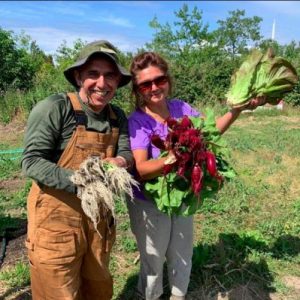 This week we are featuring Vida Farm, a first-year vendor at our market! Vida Farm is a small scale urban farm focused on food security and community health, growing more nutritious, fresher and tastier vegetables with a lower carbon footprint. We recently had the pleasure of chatting with owner, Vida Rose, to find out more.
This week we are featuring Vida Farm, a first-year vendor at our market! Vida Farm is a small scale urban farm focused on food security and community health, growing more nutritious, fresher and tastier vegetables with a lower carbon footprint. We recently had the pleasure of chatting with owner, Vida Rose, to find out more.
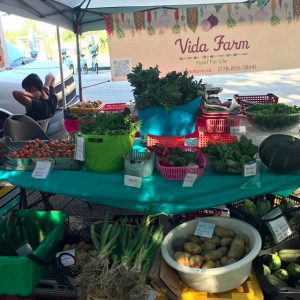 How long has Vida Farm been around? How did you get started?
How long has Vida Farm been around? How did you get started?
Vida Farm was started in 2020 but I was farming before then. In April 2016, For the very first time, I began growing vegetables after I received my community garden at Gilbert Road, Richmond. I had no previous experience at all, and I just followed my intuition and common sense. For the very first time, I grew vegetables such as eggplant, cucumber, watermelon, and bell pepper. I was learning from my own mistakes and never become discouraged if my plans were not going in a way as I was expecting. Any failure was a fuel to try harder to make a success. In the first year, I had almost 20 different vegetables in my garden, which I was able to harvest despite many wrongdoings. It was a great pleasure to observe the growth of my plants from seed all the way to become a healthy and beautiful plant. In 2017, I increased the variety of plants to 50. The feeling of seeing my vision growing in the garden was incredible. In 2018, I went to KPU farm school, and at that time, I started planting even more at my student lot and community garden. KPU was offering incubator urban farming, and I was thinking of enrolling in it. I decided to continue going to KPU farm school for one more year to become more prepared and settled in what I wanted to do. At the end of the year, I was confident about starting my farm business. I was so excited to figure out all the tools I needed, everything from getting the greenhouse, irrigation system, seeds, and compost was very new, and I was learning a lot. I have enjoyed all the steps! In 2020, CoVId 19 added more complexity to my new operation, which was another opportunity to learn.
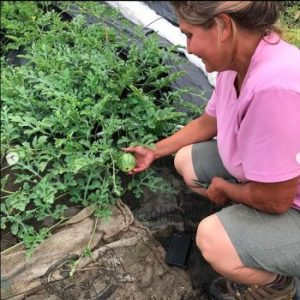 What are the three most important things you think people should know about Vida Farm?
What are the three most important things you think people should know about Vida Farm?
- The only way I know to grow vegetables is organic. At KPU farm school, we have just been learning how to grow naturally, and I do not know any other ways. KPU has applied for the certificate, and it is a work in process.
- Vida farm is like a very young and delegate plant that needs to be carefully taken care of to become stable. At this time, I need volunteers who can be involved in a lifetime learning opportunity to experience the joy of working with a purpose.
- I carefully observe my plants, bees, birds, soil to make sure I am in harmony with them and not causing any disturbance or conflict at any level. My goal is to be part of the nature orchestra and to be mindful of my actions.
You use all organic practices in your farming and are on your way to becoming a certified organic. How does organic farming differ from conventional farming?
Organic farming promotes biodiversity, crop rotation, and it uses natural fertilizer instead of chemical fertilizer. Pests and weeds are naturally managed. It improves the inhabitant of other life being and reverses the damages done to resources by a human.
Conventional farming uses unnatural chemicals and fertilizers to maximize the yield of a particular crop, which is typically genetically modified. This method demands a significant amount of chemical and energy input and weakens the ecology of a landscape.
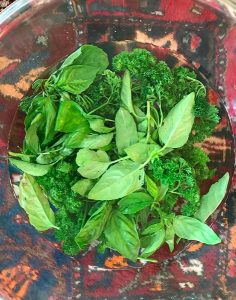 Where is your farm located? What sets urban farming apart from farming in rural areas?
Where is your farm located? What sets urban farming apart from farming in rural areas?
I am a small scale urban farmer located in Richmond at the intersection of Gilbert and Dyke road. I live 10 minutes away from the farm so I can bike or walk toward the farm if I don’t want to use my car. The distance between the farmer market and an urban farm is much closer than a rural farm. Most of the time, I can harvest some of my delegated greens for the market on the same day to deliver a fresher quality.
You use biological pest management instead of using pesticides, what are some methods you used for this?
My goal is to connect to nature and to be part of it. We call some living organisms pests, but in fact, they are delivering a message from nature to us. I observe my actions to figure out what I have done wrong to attracts pests. For managing pests, I am rotating crops and planting perennial to attract beneficial insects and birds. I keep the farm clean and tidy and collect rotten vegetables in a closed bin.
Why did you choose to come to the UBC Saturday Market specifically?
UBC Farm is in an area that is convenient for the students to bike to the market to purchase their veggies. Many of them are far from home and need to have better food choices available. UBC Farm is also a popular place for many people who are looking for good quality fresh vegetables.
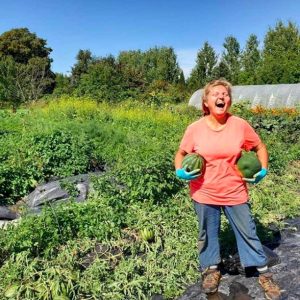 If you could only eat one item from your farm for the rest of your life, which one would it be?
If you could only eat one item from your farm for the rest of your life, which one would it be?
I put some thought Into this question and couldn’t figure out which one to chose. All the crops were at the same level of perfection to me. Tomatoes, cucumbers, melons, all different herbs such as dill, basil, parsley, mint, eggplants, potatoes, zucchinis and lettuces all would be good choices.
What’s your favourite part about being a farmer?
My favourite part of being a farmer is, having a chance to do something which can make a difference in the environment and people’s wellness. I also love the freedom and choices which nature provides in growing many different crops. The agricultural world is so vast and mystical.
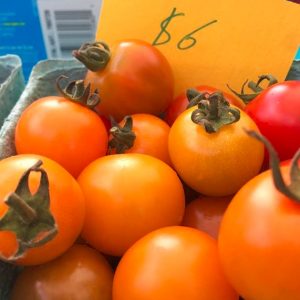 Where else can customers find you? And is there anything else you want them to know?
Where else can customers find you? And is there anything else you want them to know?
I am on Instagram, Facebook, and I also have my online store.
My goals are not just limited to growing fresh, local, organic, healthy and delicious vegetables for our community. Food is crucial for our lives and to boost our immune system to resist diseases. We need reliable and trustable local resources to secure our need for healthy food. More medium and small farms have to take part in dealing with growing local food to keep more diversity in the market and more choices for customers for a healthy competition.
Market Dates| Facebook Page | Instagram | Website |778-855-1854